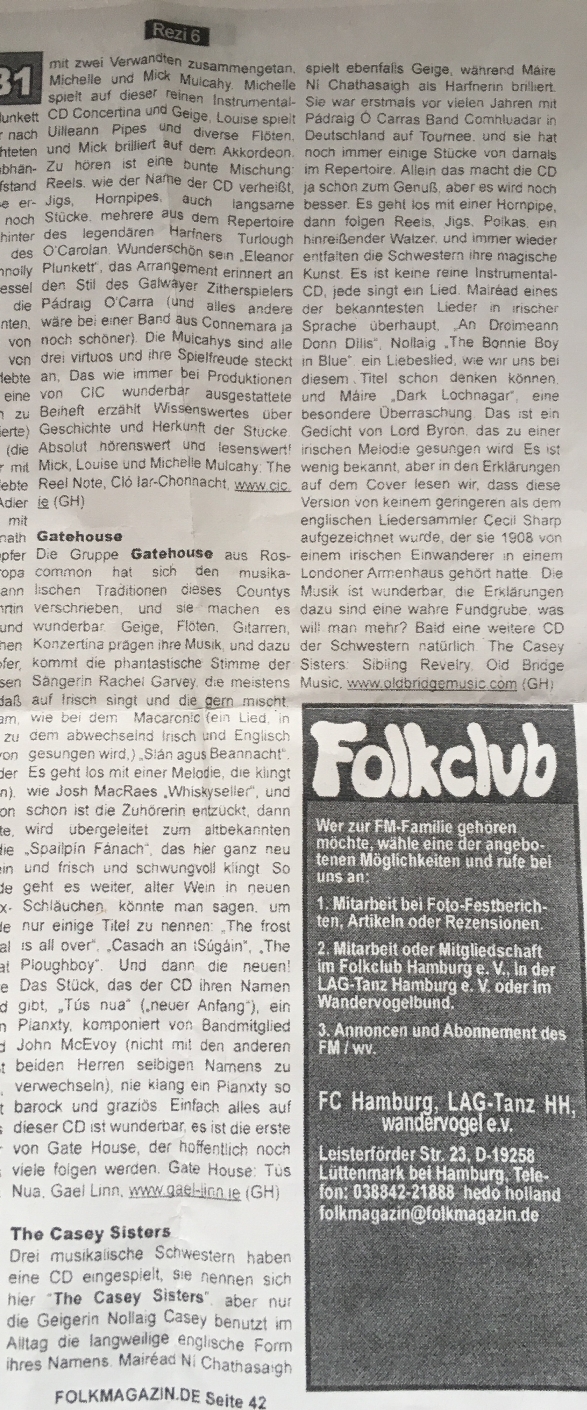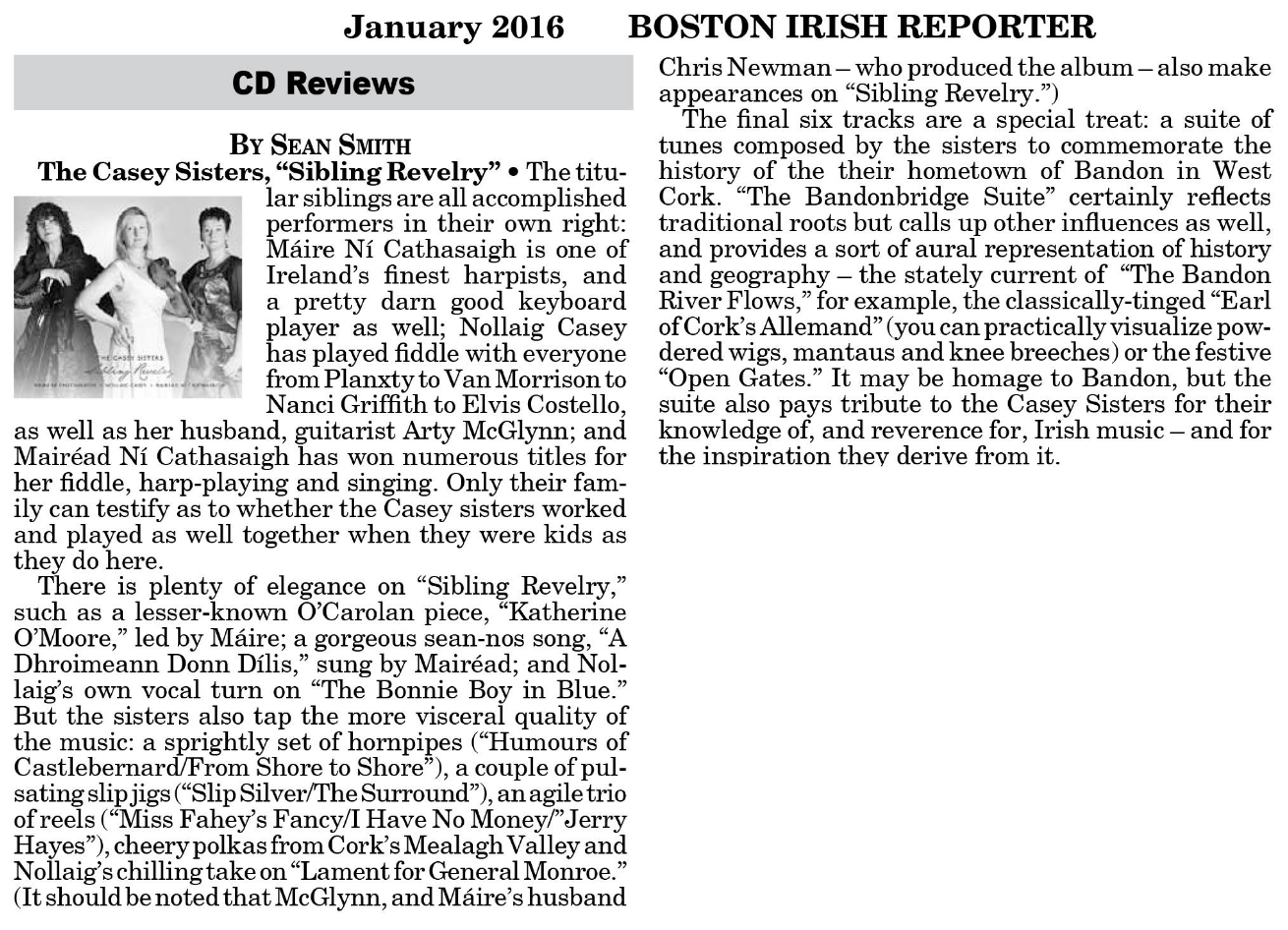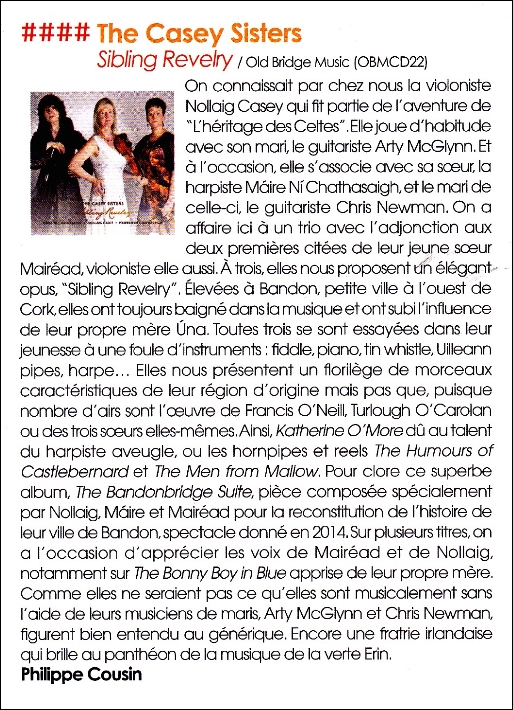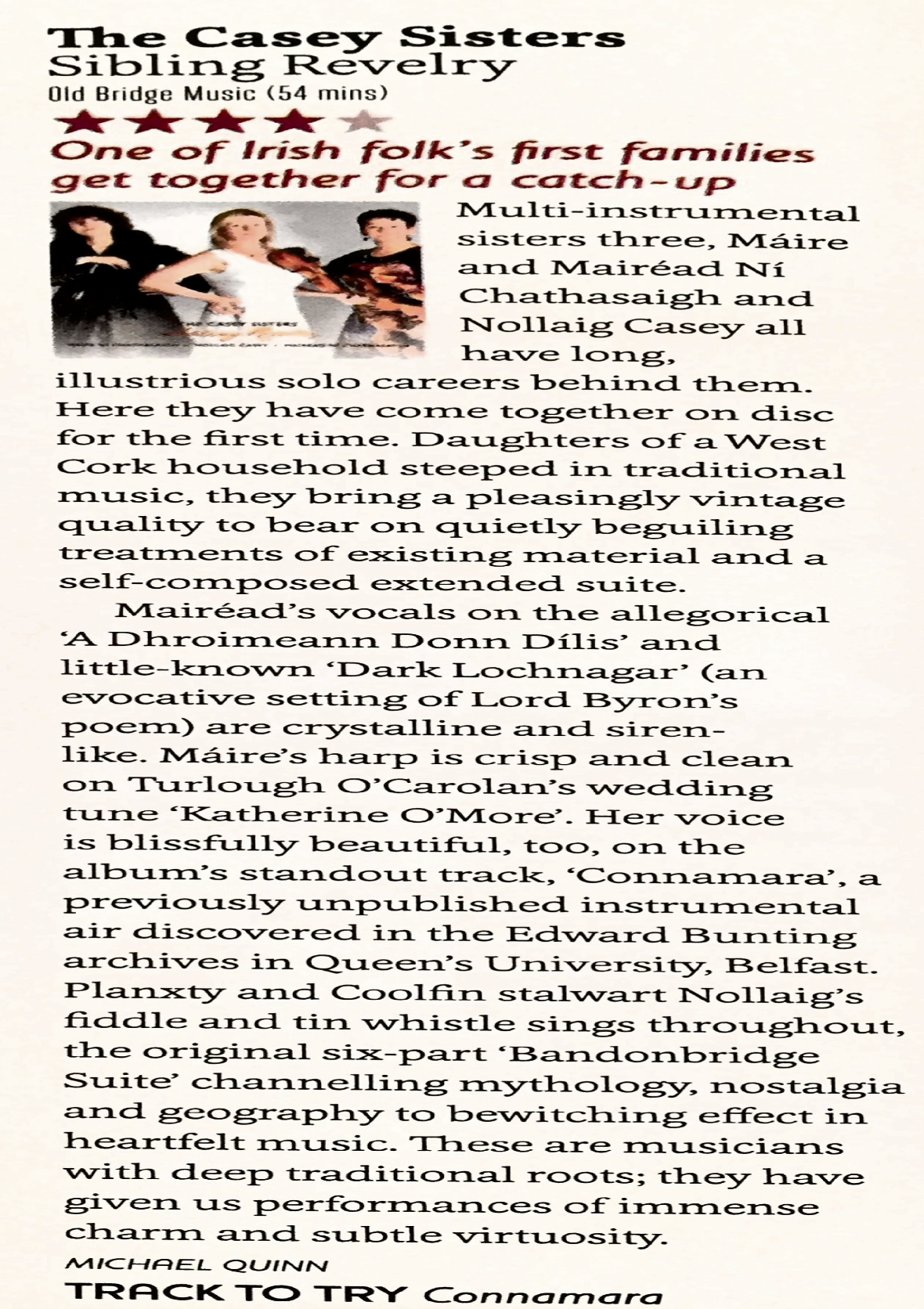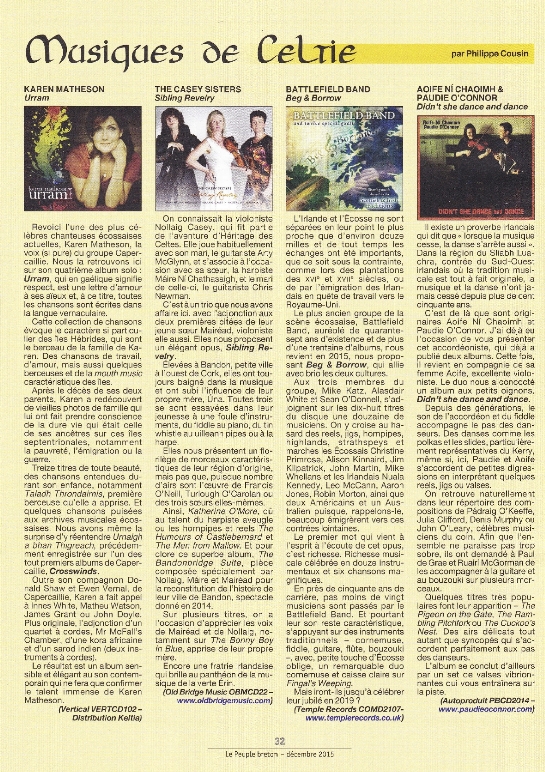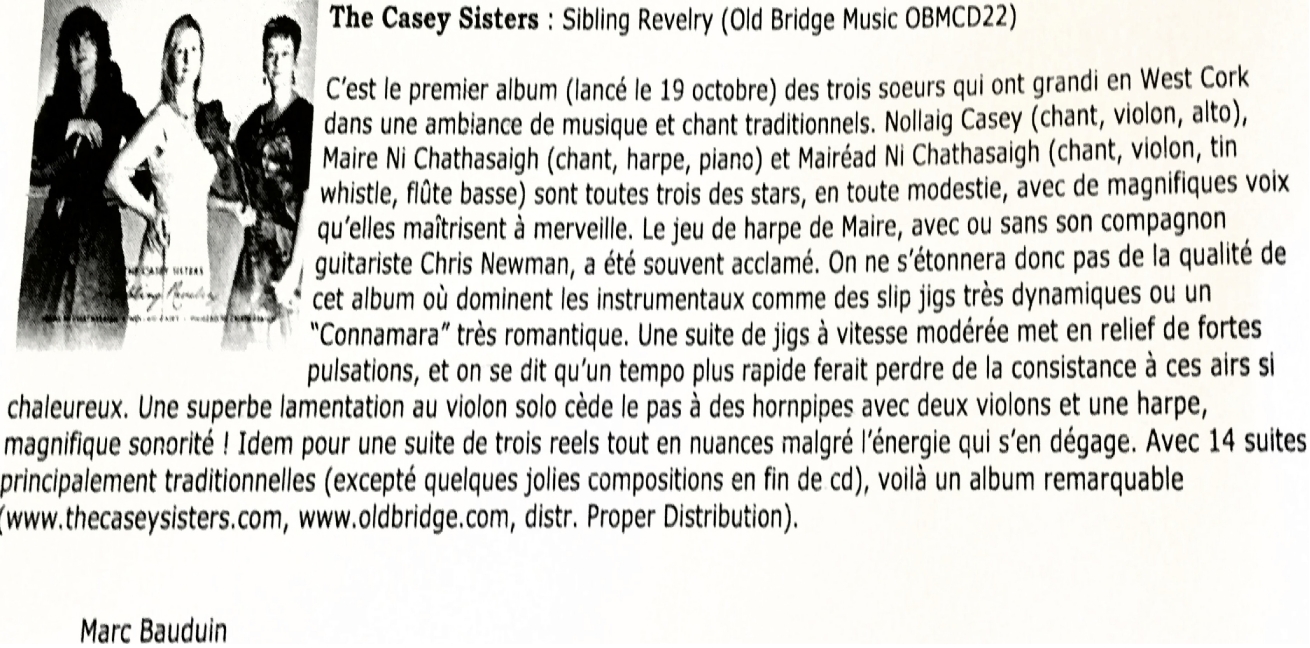|
|
||
 |
||||
TG4 Irish Traditional Musician of the Year 2001 |
||||
|
Máire and her sisters fiddle-playing and singing sisters Nollaig and Mairéad (The Casey Sisters) released their first CD together, Sibling Revelry, in late 2015. (An mage of the front cover is on the right.) Co-produced, recorded and mixed by Chris, it was one of The Daily Telegraph’s Albums of the Year, "Caithreim Ciúil"s Album of the Week (Nov 16 - 20) on BBC Radio nan Gaidheal (Scotland). A radio programme about the sisters featuring an extended interview with Ellen Cranitch was broadcast on "Grace Notes" on RTÉ Lyric FM on Thursday October 8 and is now available to listen to on the RTÉ Player - click here and then choose "Thursday 8th October" from the list on the right-hand side of the page. The CD received some great reviews in the The Irish Times * * * *, The Daily Telegraph * * * *, The Herald Scotland, Songlines * * * *, The Living Tradition, Trad Magazine * * * * (France), Le Canard Folk (Belgium), Le Peuple Breton (Brittany), The Boston Irish Reporter (USA) , Folk Magazin (Germany), Folk Bulletin (Italy), The Ulster Herald, Fatea, Bright Young Folk, FolkWords, Folking.com and Blogfoolk (Italy). To read, click the links or scroll down... Go to Reviews and Tracklisting |
|||||||||
"First-class musicianship... wonderfully |
|||||||||
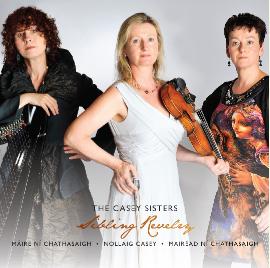 |
|||||||||
THE BOSTON IRISH REPORTER, USA, January 2016 |
|||
TRAD MAGAZINE * * * * (France), January 2016 |
|||
THE ULSTER HERALD, January 2016"Spectacular..." Full article here. |
|||
FOLKING.COM, January 2016"Rich and lovely" Full review here |
|||
SONGLINES * * * *, December 2015
|
|||
THE FOLK BULLETIN (Italy), December 2015 "E’ uscito il 15 ottobre 2015 ed è già tra i “Best Folk Albums” del 2015 per il britannico Daily Telegraph: “Sibling Revelry, il debutto discografico del brillante trio delle sorelle Casey (Ní Chathasaigh in Gaelico), ben rappresenta un sodalizio musicale di prima classe. La cantante e violinista Nollaig Casey (già coi Planxty e i Coolfin) suona meravigliosamente nell’incantevole Lament for General Monroe. Máire Ní Chathasaigh dimostra ancora una volta perché sia ritenuta una delle migliori suonatrici di arpa nel mondo. Mairéad Ní Chathasaigh ha una voce dolce, unita a un raffinato talento nel suonare il violino. In tre tracce del disco le sorelle sono accompagnate da Arty McGlynn alla chitarra acustica. Siamo di fronte a un’opera di splendida atmosfera, ancor più in Connamara, inedita composizione di Edward Bunting (1773–1843), ritrovata nella libreria della Belfast’s Queen’s University.” Originarie di Bandon, nella contea di Cork, le tre sorelle danno vita a un disco bellissimo, una delle perle del folk in Europa per questo 2015. Nollaig alla voce, al violino, alla viola e al thin whistle, Maire all’arpa, al pianoforte e alle tastiere e Mairead alla voce, al violino, al thin whistle e al low whistle sono accompagnate in alcuni brani, rimanendo sempre in famiglia, da due altre “star” del folk come Arty McGlynn alla chitarra e Chris Newman che si cimenta al basso. Nelle varie tracce dell’album si alternano brani provenienti da fonti scritte (dalle collezioni di Francis O’Neil a quelle di Ryan), per poi passare all’immancabile O’Carolan e passare poi ad esplorare il repertorio di trascrittori di musica per cornamusa come Canon James Goodman. Non mancano i brani provenienti dal repertorio di organetto e concertina, come “The Mealagh Valley Polkas” e Lament for “General Monroe”. Bella la composizione di Maire, “Harps in Bloom”, composta nel 2010 per il venticinquestimo anniversario del “Cairde na Cruite’s Cúirt Chruitireachta” (Festival Internazionale dell’arpa irlandese) ed eccellenti i due canti di derivazione familiare, imparati da Mareid e Nollaig dalla madre Una, rispettivamente “The Bonnie Boy in Blue” e “A Dhroimeann Donn Dílis” (un’allegorica canzone politica probabilmente del diciottesimo secolo, nella quale l’Irlanda viene raffigurata come una fedele mucca bruna). “Dark Lochnagar”, è una canone su parole di Lord Byron, la cui musica fu raccolta da Cecil Sharp da un irlandese residente a Londra; attualmente la melodia è maggiormente conosciuta come brano strumentale nell’attuale repertorio in terra d’Irlanda, mentre il canto è ancora in uso in Scozia, ma eseguito su una melodia differente. Una lunga suite intitolata “The Bandonbridge Suite” chiude il disco: si tratta di una rappresentazione in musica della storia della città di Bandon che raccoglie composizioni delle tre sorelle ed è stata eseguita per la prima volta nel 2014 alla settimana dell’arpa del Bandon Walled Town Festival La piccola perla del disco è infine rappresentata da “Connamara” (non ho sbagliato nel copiare, l’autore usava questo spelling!): grazie alla Biblioteca della Queen’s University di Belfast è stato possibile usare uno spartito manoscritto inedito di Edward Bunting. Ed è anche un brano molto bello. Così come questo disco è assolutamente imperdibile!" Andrea Del Favero The review original is here. |
|||
LE PEUPLE BRETON, December 2015 |
|||
THE DAILY TELEGRAPH, 8 October, 2015 * * * * "This has to be my favourite album title of the year. Sibling Revelry, the début album from the distinguished Casey-Ní Chathasaigh sisters, is an album of first-class musicianship. Singer and fiddle-player Nollaig Casey (once of Planxty and Coolfin) plays beautifully on the haunting Lament for General Monroe. Máire Ní Chathasaigh shows throughout why she is hailed as one of the world's best harp players. Mairéad Ní Chathasaigh has a sweet voice as well as a fine talent on the fiddle. They are joined on three tracks by Arty McGlynn on acoustic guitar. This is a wonderfully atmospheric album, never more so than on Connamara, a previously unpublished composition by Edward Bunting (1773–1843), which was made available by Belfast's Queen's University library." * * * * Review by Martin Chilton. Now in his list of best folk albums of 2015! |
|||
LE CANARD FOLK (Belgium), October 2015
|
|||
|
"Now who had the brainwave to bring together these three musical sisters for an album of truly joyous music-making? … You’ll know the ladies individually, of course, as front-runners in their respective fields of musical endeavour: Nollaig Casey as fiddler and singer (she also plays viola and tin-whistle), Máire Ní Chathasaigh as harpist extraordinaire (also piano and keyboard player), and Máiread Ní Chathasaigh as singer and fiddler (who also plays tin-whistle and low flute). Unbelievably, the deliciously-titled Sibling Revelry is the sisters’ first recording together (mind you, they’ve all had busy and fruitful individual careers), and yet the teaming here reveals a further inspired level of musicianship that’s beyond the intuitive. They excel on their respective instruments, sure, but they also possess an innate grasp of internal dynamics (whereby felicities of balance are keenly observed) and an uncanny ability to listen to each other and respond in kind, rejoicing in spontaneity of expression. The material chosen for this album is thoughtfully and impeccably arranged, and ideally sequenced for optimum listening pleasure. It comprises mainly instrumental items, with just three songs carefully interleaved; of these, two are sung by Mairéad and one by Nollaig, and both singers display both a constant purity of tone and an unassumingly accomplished clarity of diction. The instrumental repertoire is an enterprising selection of traditional tunes, largely from manuscript collections, with one by O’Carolan and one by Máire herself, while the ten-minute closing track, the six-part Bandonbridge Suite, has individual sections composed by individual sisters. Good use is made of the possibilities of both arrangement and studio facilities for imaginative presentation; sometimes, Nollaig doubles her fiddle parts or else creates a mini-string-section by adding the darker timbre of viola to the mix, while the colours of tin-whistle and low flute add further variety to five of the selections and Máire’s harpistry is as skilled and scintillating as ever. Arty McGlynn’s guitar accompanies deftly on three tracks, including the final movement of the Suite, and Chris Newman plays bass on one of the songs. Even so, one of the album’s standout tracks is Nollaig’s pindrop solo performance on her adaptation of Lament For General Monroe. The entire album represents a glorious and wholly delectable celebration of expertise in sibling musicianship of the highest order, and proves a life-affirming experience, a joy from start to finish." David Kidman |
|||
|
"The intriguingly titled ‘Sibling Revelry’, the debut album from the class act that is The Casey Sisters, exudes the highest levels of talented musicianship and without doubt manifest skill. The word ‘expressive’ could easily sum up this album as the sisters pour so much of themselves into the music it talks to the listener on so many levels. The lightest of airs rub shoulders with ‘soul-touching’ songs and ‘step-inducing’ dance tunes to conjure an experience that will simply sweep you away into its enveloping embrace. From the first moments, with the entrancing energy of ‘The Humours Of Castlebernard/ From Shore To Shore’ through the soft gentleness of ‘Katherine O’More’ to the haunting ‘A Dhroimeann Donn Dílis’ this album will hold you rapt. Were it possible to pick favourites from this album because the whole is so good and everyone will find their own preferences, then for me the dramatic ‘Lament For General Monroe’, their wholly impressive take on ‘Dark Lochnagar’ and impressive expanse of the specially composed, six-part ‘The Bandonbridge Suite’ are the ones that I lean towards the most." Charlie Elland |
||
|
1. The Humours of Castlebernard / From Shore to Shore 2. Katherine O’More 3. A Dhroimeann Donn Dílis 4. Slip Silver / The Surround 5. Connamara 6. Fan mar a bhfuil tú, a chladhaire (“Stay where you are, you rogue”) / The House Keeper / Petticoat Loose 7. Lament for General Monroe 8. The Men from Mallow / McCarthy’s Hornpipe 9. The Bonnie Boy in Blue 10. Miss Fahey’s Fancy / I have no Money / Jerry Hayes 11. Dark Lochnagar 12. Harps in Bloom 13. The Mealagh Valley Polkas 14. The Bandonbridge Suite: a) Dreams of Castlemahon – composed by Máire b) The Bandon River Flows – composed by Nollaig c) The Earl of Cork’s Allemand d) The March from Irishtown e) The Bandonbridge Hornpipe f) The Gates are Open |
|||
|
||||||||||||||
